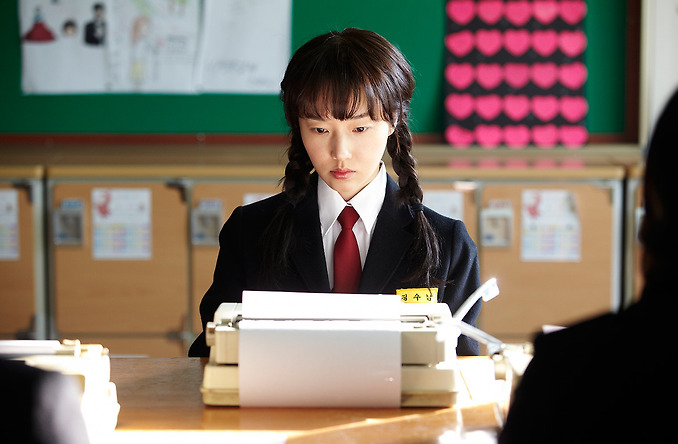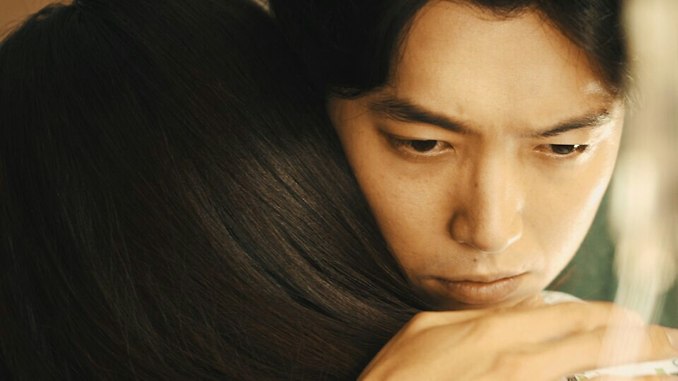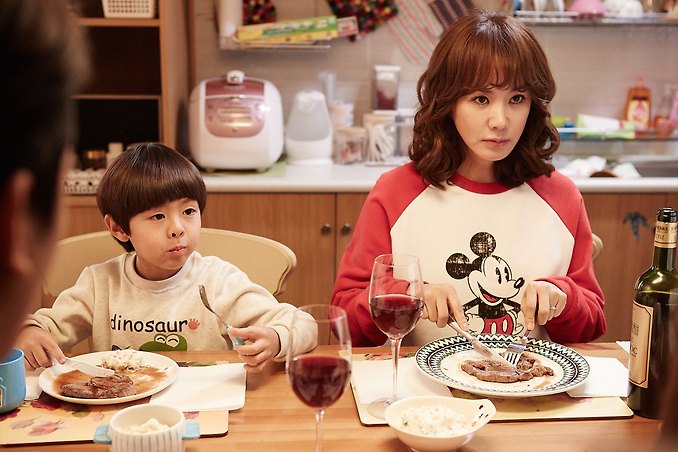Alice in Earnestland
(성실한 나라의 앨리스)
By Fabien Schneider
Thanks to her skilled hands, Su-nam has been able to get no less than 14 typing certificates, which makes her one of the best secretary one can imagine. However, she cannot compete with a computer, and thus loses her job for a machine. She manages to find a new job, and also find a boyfriend. But when they decide to get married and buy a house, they have no other choice than taking a loan. Now that they have to pay off the loan, Su-nam suddenly has an idea to solve this situation once for all.
Thanks to her skilled hands, Su-nam has been able to get no less than 14 typing certificates, which makes her one of the best secretary one can imagine. However, she cannot compete with a computer, and thus loses her job for a machine. She manages to find a new job, and also find a boyfriend. But when they decide to get married and buy a house, they have no other choice than taking a loan. Now that they have to pay off the loan, Su-nam suddenly has an idea to solve this situation once for all.
For his first feature film, Director Ahn Gooc-jin is already making a bold work that’s bound to get international recognition. This is indeed a vengeance film at its core, the vengeance being enacted against the society as a whole, and by a woman oppressed by economical struggle. The trailer hints at a satirical tone that is all the more welcome. Korean critics seem to have enjoyed this film, most of them praising the stellar performance of the lead actress, Lee Jung-hyun, who manages to bring us into her craziness. As she’s both an actress and a popular singer, one would be eager to catalog her as nothing more than a Korean idol, but that would be a mistake. She first started her acting career with a blast, starring in A Petal (1996) at the age of 14 and gaining by the way many awards. It’s only after this that she became the most important star of Korean dance music during the 90s, some of her compositions having arguably been danced on even in European clubs. She’s been coming back to the acting recently, with Juvenile Offender in 2012, and the TV drama The Family Is Coming this year. For a film produced by the KAFA, one of the most famous film schools, Lee Jung-hyun’s stardom surely must help it to get noticed by the general audience. It also won the Korean Competition Award at Jeonju Int. Film Festival. With a bit more than 60 screens, this film surely will have a fair run in theaters.
Amor
(그리울 련)
Hee-yeon is about to die due to an incurable illness. As her fatal day is approaching, she asks her boyfriend, Tae-woo, to get rid of every souvenir of her so that he could forget her and move one. A few days later, while Tae-woo is becoming more depressed by the situation, he suddenly comes upon a woman lying in his bathroom. Despite her not telling who she is, Tae-woo brings her back to her home. But as soon as he comes back from his work, she’s here again, waiting for him. He then decides to let her live with him.
This first feature by debuting director Han Cheol-soo is not your typical romantic drama, since it’s infused with fantastic elements, which allowed it to be showed this year at Bucheon Int. Fantastic Film Festival. This indie production too managed to bring a famous woman idol, this one being Mina Fuji, a Japanese actress who started at 9 in musicals before getting supporting roles in a few films. If you wonder how such a minor actress got to be known in South-Korea, this is thanks to her frequent appearances in music videos of some of the most popular K-pop bands, soon followed by her participation in We Got Married, one of the most important real-TV shows in Korea. With her and Jung Kyoung-ho, a TV drama actor, in the lead roles, the target audience is undeniably the same than your usual TV drama, namely teenagers and middle-aged women. This film will be screened in around 20 theaters, and has so far received midly positive reviews.
Watch here the trailer in Korean.
Watch here the trailer in Korean.
Memories of the Sword
(협녀, 칼의 기억)
During the Goryo dynasty, Pung-cheon, Wol-so and Yu-baek, three skilled warriors, are leading the rebellion against their king. But Yu-baek reveal himself to be a traitor, and Pung-cheon get killed in the ensuing fight. Wol-so escape from the turnabout and lets her be forgotten while raising Punch-cheon’s daughter, Hong-yi. After spending 18 years being trained in sword fighting, Hong-yi is now ready to get revenge and receives from Wol-so her father’s sword.
Lotte Entertainment must have thought to have struck gold this summer by releasing an action film gathering Jeon Do-yeon (The Housemaid in 2010, Secret Sunshine in 2007) and Lee Byung-hun (Terminator Genesys in 2015, Masquerade in 2013, and Bittersweet Life in 2005), both of them being among the most internationally famous Korean actors. It’s quite notable that this is Lee Byung-hun’s first Korean film since his resounding “scandal” last September in which he accused two idols of attempted blackmail after they had shot a video of him drunk and proffering sexual jokes. The young Kim Go-eun, discovered in Eun-gyo (2012), also joins the two veteran actors. Park Heung-sik, the director, is best known in Korea for his first film, I Wish I Had a Wife (2000), and has since made unremarkable films. While some critics are praising the film for its visuals and action, others are wondering how such an amazing cast could be wasted to such an uninspired (some would even say stupid) scenario. The comments on Internet are even more virulent, especially against Kim Go-eun whose performance has been regularly ironised as “foot acting”, i.e. she has the acting skills of a foot. This is quite a change from the time when she was unanimously acclaimed at her debut. But with around 570 screens at its release, this film is almost bound to find a place in the box-office.
Watch here the trailer with English subtitles.
Watch here the trailer with English subtitles.
Wonderful Nightmare
(미쓰 와이프)
Yeon-wu is a careerist woman whose busy activity as a lawyer leaves no time for thinking about love. As she’s about to turn a new page in her career by working in the US, she dies in a car accident. But when she arrives in heaven, she’s being told that it was someone else with the same name who was supposed to die. The manager in heaven tries to make up for his mistake by sending her back on Earth for one month, except that she now ends up in the body of a housewife and mother.
Director Kang Hyo-jin is walking on moving sand with his fifth film, whose original title is the transcription of “Miss Wife”. Indeed, this kind of script seems to portray as deviant single women who prefer to have a successful career instead of starting a family, in the same way that Jurassic World infamously did this summer. Of course, it’s yet to been seen if my worries are founded. In the leading role is Uhm Jung-hwa, a pop singer turned actress who is now better known for her films than for her songs. She starred in Marriage Is a Crazy Thing (2002), All For Love (2005) and Montage (2013). She fits particularly well to this kind of role, since she’s often seen as a successful independent woman. The film received mixed reviews, from average to good, and will occupy around 430 screens, making a strong contestant for the box-office.
Watch here the trailer in Korean.
Watch here the trailer in Korean.
Factory Complex
(위로공단)
In early 2014, in Cambodia, sewing workers raised their voices to denounce the conditions in which they were supposed to work, that is to say exploitative shifts for a low pay. The authorities answered to their complaint with violence, resulting in the death of a 21 years old woman, shot in the head. For the Korean women who fought for their rights in the 70’s as industrial workers, these events sound like a reminiscence of the past. Their daughters are now working in the service sector, in customer service, transportation companies or supermarkets. But despite this improvement, most of them still have to endure sufferings and abuses. Why did their conditions have barely even changed in the last 40 years?
In the last few years, documentaries have been one of the new rising trends of Korean films. We’ve seen so far that some topics have been more popular, like environmental issues, social concerns and political scandals. But this one is among the very first to bear a reflexive position on South-Korea’s difficult past by comparing it to the actual situation of South-East Asia. This is not a trivial matter: keep in mind that there is a lot of resentment in Korea against the immigrants from that part of the continent. But this films wants to tell Korean audience that these peoples are going through the same troubles than they did not so long ago. This comes from Lim Heung-soon, who debuted as a video artist before releasing in 2012 is first feature documentary, Jeju Prayer. This film could only be made thanks to the AND Fund from Busan Festival, and has been selected by many local festivals, including Seoul Independent Film Festival, and also at Shanghai Int. Film Festival. It has received a lot of extremely positive reviews from the press, so this is definitively a documentary on which we should keep an eye. Available on 33 screens scattered on the Korean territory, it may have a decent run.
Watch here the trailer in Korean.
Watch here the trailer in Korean.
New Korean Films is a weekly feature which provide an in-depth look at new local releases in Korea. For film news, external reviews, and box office analysis, take a look at the Korean Box Office Update, Korean Cinema News and the Weekly Korean Reviews, which appear weekly on Monday, Wednesday, and Friday mornings (Korean Standard Time). Reviews and features on Korean film also appear regularly on the site.






No comments:
Post a Comment